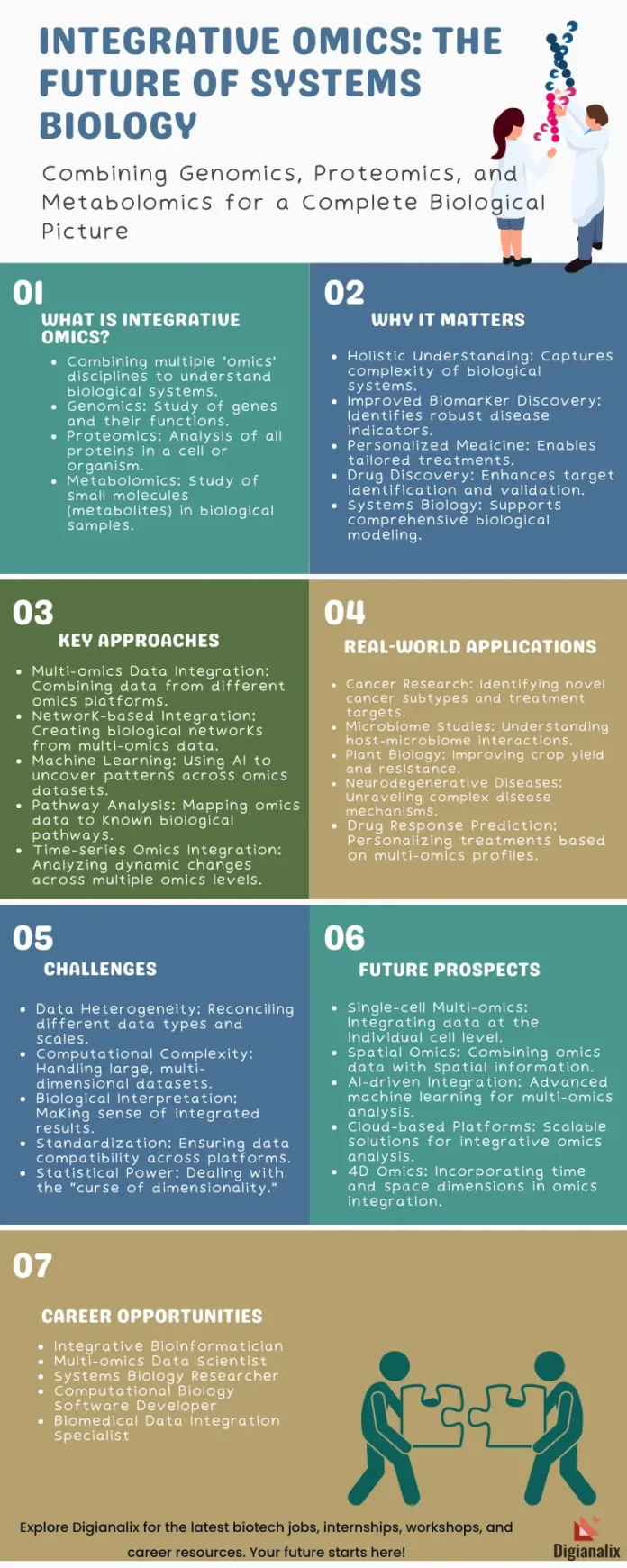Hey there, data-driven biology enthusiasts! 👋 Ready to explore the fascinating world of integrative omics? Let’s dive into how combining genomics, proteomics, and metabolomics is revolutionizing our understanding of biological systems!
🧬 What’s the buzz about integrative omics?
Integrative omics is the next frontier in bioinformatics, bringing together multiple ‘omics’ disciplines to paint a complete picture of biological processes. It’s like assembling a complex puzzle, where each ‘omics’ field contributes unique pieces:
- Genomics: The study of an organism’s complete set of genes
- Proteomics: Analysis of all proteins expressed by a genome
- Metabolomics: Examination of small molecule metabolites in biological samples
By combining these approaches, we gain unprecedented insights into how biological systems function at multiple levels.
🚀 Why integrative omics matters
- Holistic understanding: Captures the complexity of biological systems
- Improved biomarker discovery: Identifies more robust disease indicators
- Personalized medicine: Enables tailored treatment strategies
- Drug discovery: Enhances target identification and validation
- Systems biology: Supports comprehensive modeling of biological processes
💡 Key approaches in integrative omics
- Multi-omics data integration
- Combining data from different omics platforms
- Tools: MixOmics, OmicsNet, 3Omics
- Network-based integration
- Creating biological networks from multi-omics data
- Example: Cytoscape for network visualization and analysis
- Machine learning in integrative omics
- Using AI to uncover patterns across omics datasets
- Techniques: Deep learning, random forests, support vector machines
- Pathway analysis
- Mapping omics data to known biological pathways
- Tools: Ingenuity Pathway Analysis (IPA), KEGG
- Time-series omics integration
- Analyzing dynamic changes across multiple omics levels
- Example: COVAIN for time-resolved omics data analysis
🔬 Real-world applications
Let’s look at some exciting applications of integrative omics:
- Cancer research
- Identifying novel cancer subtypes and treatment targets
- Example: The Cancer Genome Atlas (TCGA) multi-omics data analysis
- Microbiome studies
- Understanding host-microbiome interactions
- Tools: QIIME2 for multi-omics microbiome data integration
- Plant Biology
- Improving crop yield and resistance
- Case study: Integrative omics in rice stress response research
- Neurodegenerative diseases
- Unraveling complex disease mechanisms
- Example: Multi-omics analysis in Alzheimer’s research
- Drug response prediction
- Personalizing treatments based on multi-omics profiles
- Approach: Pharmacogenomics combined with proteomics and metabolomics
🧩 Challenges in integrative omics
While promising, integrative omics faces some hurdles:
- Data heterogeneity: Reconciling different data types and scales
- Computational complexity: Handling large, multi-dimensional datasets
- Biological interpretation: Making sense of complex, integrated results
- Standardization: Ensuring data compatibility across platforms
- Statistical power: Dealing with the “curse of dimensionality”
🔮 Future prospects
Exciting developments on the horizon include:
- Single-cell multi-omics: Integrating omics data at the individual cell level
- Spatial omics: Combining omics data with spatial information
- AI-driven integration: Advanced machine learning for multi-omics analysis
- Cloud-based platforms: Scalable solutions for integrative omics analysis
- 4D omics: Incorporating time and space dimensions in omics integration
💼 Career opportunities in integrative omics
Interested in this field? Consider these roles:
- Integrative bioinformatician
- Multi-omics data scientist
- Systems biology researcher
- Computational biology software developer
- Biomedical data integration specialist
🤔 What’s your take?
Are you excited about the potential of integrative omics? What challenges do you foresee in combining these complex datasets? Share your thoughts in the comments below!
Stay at the forefront of this exciting field by subscribing to our site. Let’s explore how integrative omics is reshaping our understanding of biology together!




